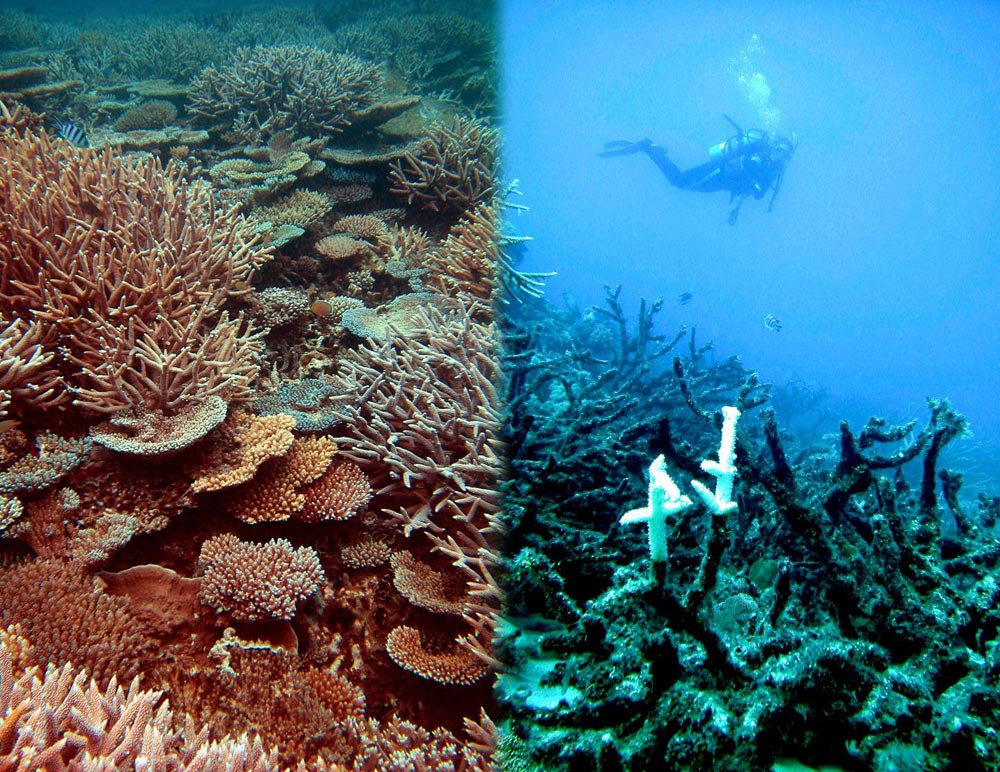
The 'End of the high seas', or we watch the seas die

The left side of this photo shows a healthy reef at Heron Island. The right side shows an example of a degraded reef off Townsville after attack from Crown of Thorns and bleaching.
Credit: Reproduced with Kind permission of Ove Hoegh-Guldberg, Global Change Institute at the University of Queensland
Speaking to the world's major gathering of geochemists, Professor Peter F Sale (University of Windsor, Canada) spelled out the stark choice facing climate scientists in the run-up to the Paris conference. The stated aim for the COP21 climate conference is to limit a temperature increase to less than +2C by the end of the century*.
According to Professor Sale:
“Even if Paris is wildly successful, and a treaty is struck, ocean warming and ocean acidification are going to continue beyond the end of this century.”
He continued:
“This is now serious; I find it very unlikely that coral reefs as I knew them in the mid-1960s will still be found anywhere on this planet by mid-century. Instead, we will have algal-dominated, rubble-strewn, slowly eroding limestone benches. I see little hope for reefs unless we embark on a more aggressive emissions reduction plan. Aiming for CO2 at 350ppm, or a total warming of around 1C is scientifically defendable, and would give reefs a good chance; a number of coral reef scientists have called for this.
A goal of stabilising CO2 at less than 350ppm is also environmentally cautious. Getting to +2oC or so, overshooting along the way, is unwise, self-defeating, and may have far more serious consequences than are dreamed of by politicians happily negotiating minimalist responses to climate change
“As well as CO2 emissions, we must also deal with our other insults to the oceans. We have lost 90% of our commercial fish biomass since the 1940's, we are polluting coastal waters, and the great majority of marine protected areas are not being protected. Either we agree limits, which means the end of the' high seas', or we let large parts of the seas die”.
Professor Sale summarised:
“Knowing what we are doing, do we have the ethical right to eliminate an entire ecosystem from this planet? It's never been done before. But watching as our actions lead to the loss of all coral reefs on the planet is like removing all rainforests. I don't believe we have that right”.
Professor Ove Hoegh-Guldberg, Coordinating Lead Author of section on 'The Ocean' within the latest IPCC (Intergovernmental Panel on Climate Change) report, said:
“We need to wake up to the idea that business as usual, even clever taxation schemes, will not act fast enough to reduce global emissions. This is a global emergency, which requires us to decarbonise within the next 20 years, or face temperatures that will eliminate ecosystems like coral reefs, and indeed many systems that humans depend on.”
“At the same time, dealing with non-climate stresses will be vitally important – we must buy time by building resilience in Earth's biological systems, given that even more stringent activities will still result in much warmer and more acidic oceans, than today”
Noted coral expert, Professor John (Charlie) Veron, former chief scientist of the Australian Institute of Marine Science commented:
“The extreme gravity of the current predicament is now widely acknowledged by reef and climate scientists. They also accept that only drastic action starting now will prevent wholesale destruction of reefs and other similarly affected ecosystems. Should humanity not be successful in preventing these threats from becoming reality no amount of management or expenditure will save future generations from the consequences of our failed guardianship”.












